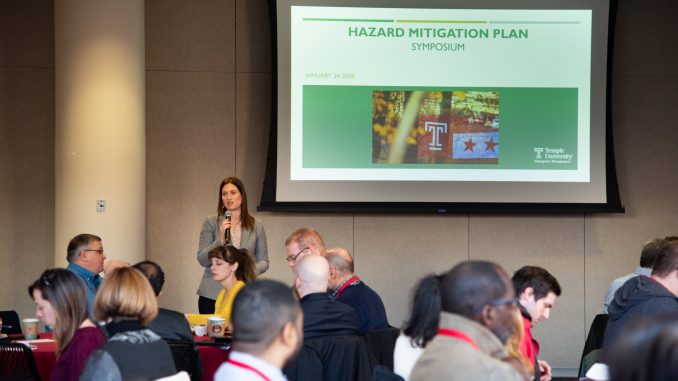
More than 100 staff members, administrators and students gathered in the Howard Gittis Student Center for Temple’s first Hazard Mitigation Symposium on Friday morning.
Hazards involve any disaster, from a chemical spill to a severe tornado or dangerous winter storm, said Sarah Powell, the university’s director of emergency management, during her speech at the event.
University offices, including Campus Safety, Dean of Students, Student Health Services, Operations and Maintenance, Information and Technology Services and the Environmental Health and Radiation Safety Department, each presented how their offices are prepared to deal with hazards on campus.
Temple’s hazard mitigation plan details 155 mitigation strategies that the university actively employs as well as measures that Temple community members should take to avoid hazards such as phishing scams, active assailants and power outages.
The Office of Emergency Management, for instance, presented on developing resilience against hazards like power outages, food shortages or internet network loss. The office also discussed mitigating the disruption of student housing due to fires, floods, heat loss or natural disasters.
Other offices discussed how Temple’s power generator functions during emergencies, how the university works to reduce the outbreak of infectious diseases, preventing and responding to student deaths, responding to hazardous biological, chemical and radioactive materials and avoiding internet phishing scams.
Larry Brandolph, associate vice president of Computer Services and Temple’s chief information security officer, suggested holding the symposium as a poster session so attendees could easily ask questions, Powell said.
“We want this to be a dialogue. We want people to know what we’re doing,” Powell said.
In her speech, Powell talked about the importance of being prepared for a disaster at any given time.
“Preparedness is everyone’s job and if we’re ready to be a resilient population,” Powell said. “Everyone needs to play their part. It’s not us just telling you, it’s kind of a joint effort for us all.”
Charles Leone, executive director of Campus Safety Services, said he agrees with Powell.
“We want people to get educated, to know the important stuff, being prepared, knowing the infrastructure that we have,” said Leone, who presented on how to handle a potential active shooter-assailant incident at Temple.
Throughout the event, representatives from the Office of Emergency Management collected surveys from attendees which asked about their preparation for disasters, their confidence in the university’s emergency procedures, their ability to handle hazards and additional measures the university could take in emergency situations.
Emergency Management will use the survey responses to review Temple’s hazard mitigation plan with the community’s feedback in mind and make final edits before publishing the plan, which has been in the works since 2019, Powell said.
“Part of this meeting is to present what some of those contents of the plan consist of based on these posters and then the final plan will be done after we get feedback from everybody here today,” Powell said.
Joe Garcia, deputy director of the Temple University Police Department, would like to see more preparation for disasters that the university has a smaller chance of experiencing, such as earthquakes, he said. Garcia is also concerned about climate change, he added.
“Think about climate change coming it gets too warm,” Garcia said. “We have an earthquake and then we have a building that’s cracked, unstable, and could just fall.
Rebecca Collins, director of the Office of Sustainability, also worries about the impact of climate change on emergency preparedness, she said.
“How we are going to continue to generate power if the grid were to go down,” Collins asked. “Those things are really important to think about from a safety, security standpoint and unfortunately, we’re having to think about them more and more as these extreme weather events occur.”
The Federal Emergency Management Agency requires all municipalities to hold public forums in which the community gives feedback for their hazard mitigation plans, Powell said.
FEMA also requires municipal governments to update their plans every five years. Temple plans on updating its Hazard Mitigation Plan every five years as well, according to the plan’s executive summary.


Be the first to comment